Keyword Searches Using Wildcards
|
|
This topic describes search behavior when Windchill Index Search is installed and enabled and using the default preference settings. The following examples do not apply to scenarios in which you are performing a database search or non-indexed keyword search.
See Search Wildcards for additional use case examples.
|
When you perform an indexed keyword search that includes an asterisk character wildcard (*), the placement of the wildcard in your search string might limit the fields that are searched:
• Trailing asterisk (keyword*) — The keyword, followed by zero or more characters, is compared against all object attributes and text within content files.
• Leading asterisk (*keyword) — The keyword, preceded by zero or more characters, is compared against the Name and Number attributes. The keyword is also compared against object attributes other than Name and Number attributes, and text within content files, but this does not return results for the keyword preceded by one or more characters.
|
|
The objects will be searched against attributes other than Name and Number, and within file content only when Keyword Search Behavior preference value is set to ‘Keyword’. In the following examples related to Leading Asterisk search, it is assumed that the preference is set to “Keyword”, which is also the default value.
|
Wildcard characters cannot substitute for white space between keyword strings. This might be potentially confusing, given the fact that Windchill Index Search replaces some special characters with white space. An example of this behavior is provided below.
Example: Trailing Wildcard
In this example, you perform a search for the keyword “form” followed by zero or more characters:
|
Keyword
|
form*
|
Search Results
The keyword, followed by zero or more characters, is compared to all indexed object attributes and indexed content text:
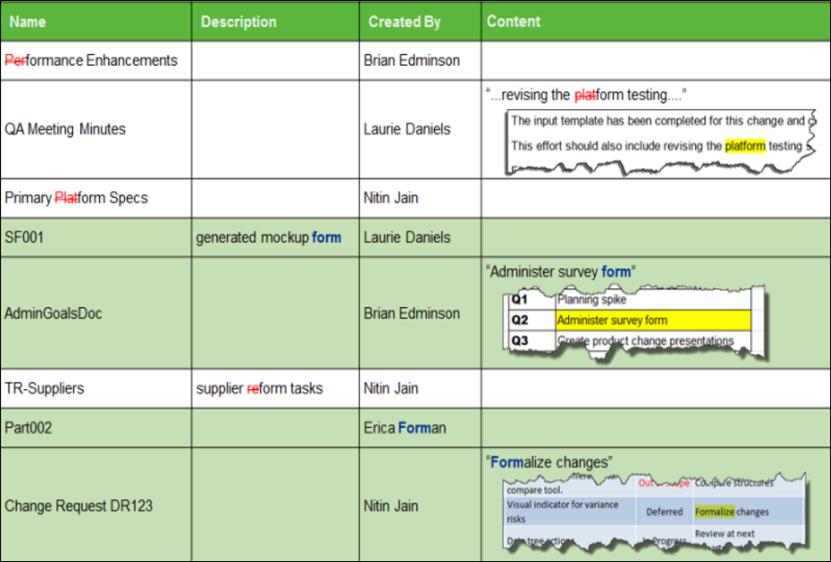
Example: Leading Wildcard
In this example, you perform a search for the keyword “form” preceded by zero or more characters:
Keyword | *form |
Search Results
◦ The keyword, preceded by zero or more characters, is compared to the Name and Number attributes.
◦ The keyword is also compared against object attributes other than Name and Number attributes, and text within content. However, the preceding wildcard is ignored. Therefore, the content and other attributes are only searched for the word “form”.
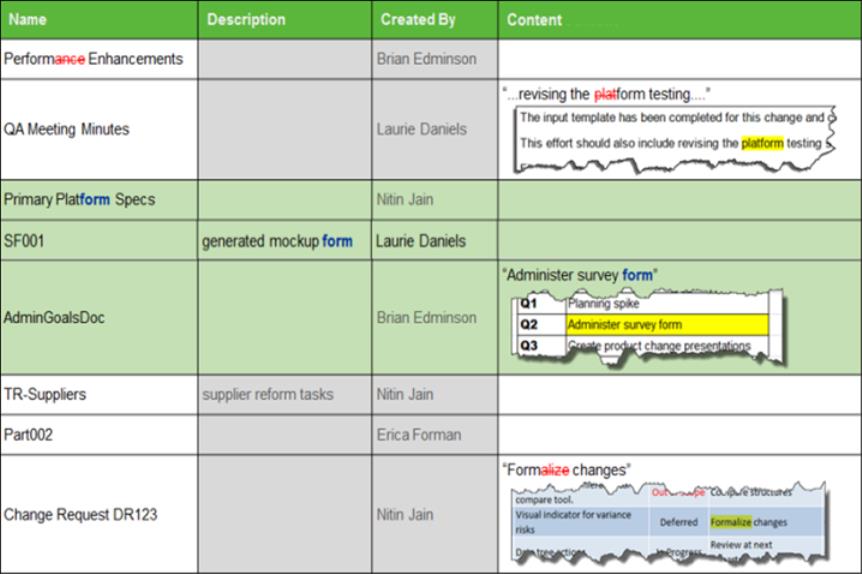
• “QA Meeting Minutes” is not returned as a result because Windchill does not apply the leading wildcard when searching content text. Therefore, the word “platform” in the content is ignored. However, the object named “Primary Platform Specs” is returned because Windchill does apply the leading wildcard when searching the Name and Number attribute values. • “TR-Suppliers” is not returned as a result even though “reform” is included in its Description attribute value. This is because when you use a leading wildcard, only the Name and Number attribute fields are searched for ‘*form’. Other object attribute such as Description is not searched for “*form”. If the word “form” was present in the Description attribute value, without any leading or trailing characters to it, the object “TR-Suppliers” would have qualified to appear in search results.. • The object named SF001 is also returned as a result because the exact word “form” is included in the Description attribute. |
Example: Leading and Trailing Wildcards
In this example, you perform a search for the keyword “form” that can be surrounded by zero or more characters:
Keyword | *form* |
Search Results
In this search, the results from the previous two searches are combined:
◦ The keyword, preceded by zero or more characters, is compared to the Name and Number attributes.
◦ The keyword, followed by zero or more characters, is compared to all indexed attributes.
Because these two rules are combined, the search also includes objects whose Name or Number includes “form” surrounded by one or more characters (for example, “performance” or “reformat”). |
◦ The keyword is compared against content. The preceding wildcard is ignored, but the trailing wildcard is kept.
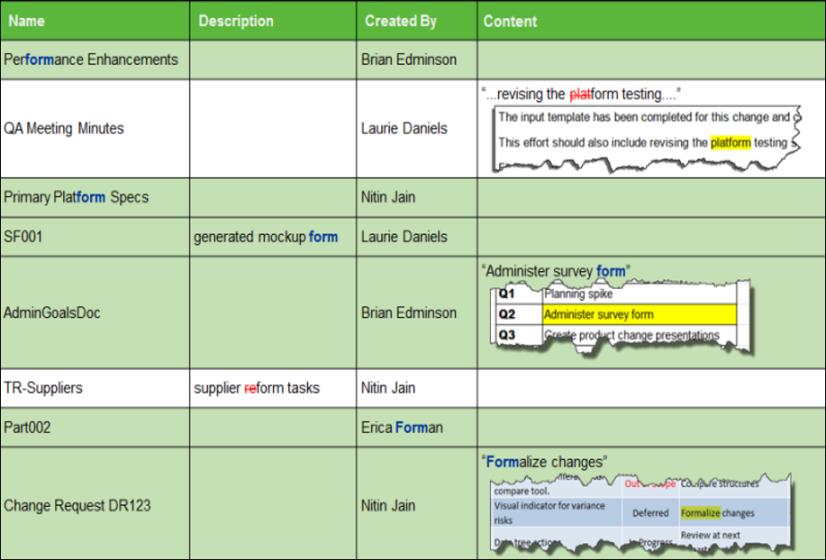
Example: Wildcards within a Single Keyword Term
In this example, you perform a search for the keywords “oil” and “pump” linked by one or more characters.
Keyword | oil*pump |
Search Results
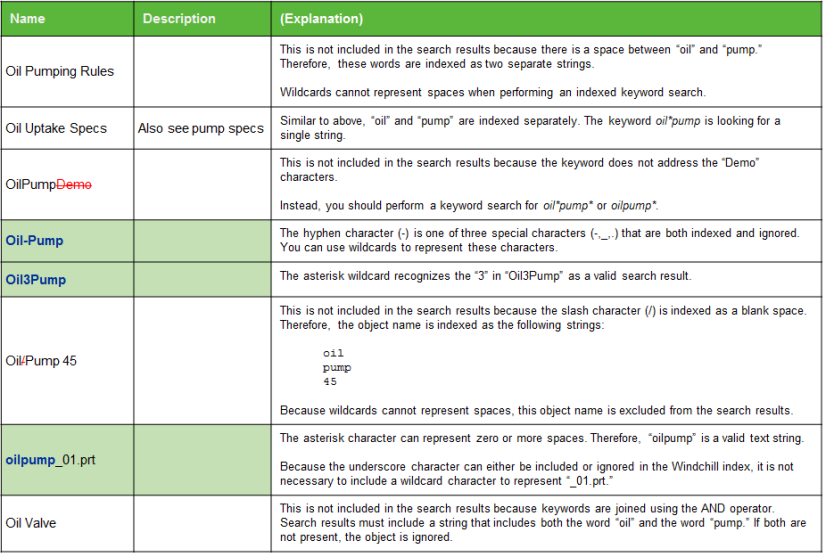
For more information, see the following:
Example: Wildcards within Two Separate Keyword Terms
In this example, you perform another search for the keywords “oil” and “pump.” However, this time you include a space between “oil*” and “pump.”
Keyword | oil* pump |
Search Results
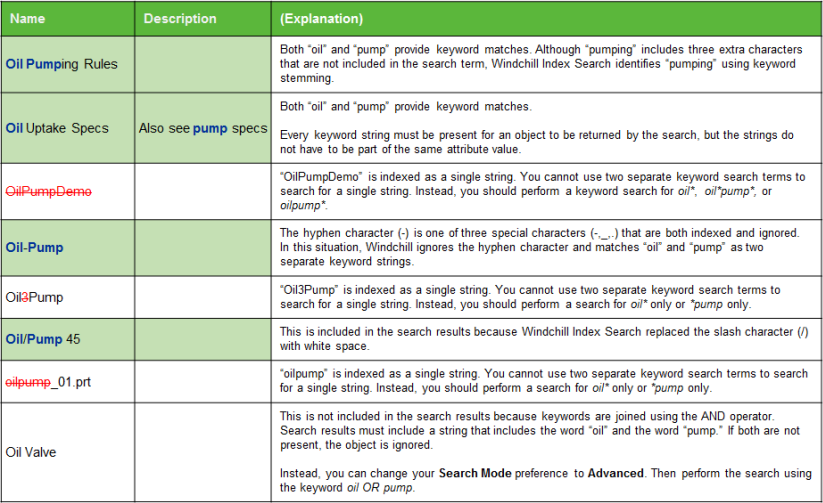
For more information, see the following: